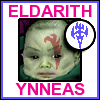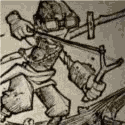|
Hrm, the more I think about it, maybe just doing (10+Magery)-3 would be better. The PCs would have low skill levels with their Spells, but considering how much stuff Nouns/Verbs can really do, that might be for the best. They can just take specific spells as techniques if they need a slightly cheaper boost for their main-stays, kind of like the Thaumatology book suggests. Additionally, I intend for them to be students, with plenty of room to learn and improve, so it may be better in the long run that way. In return, they could probably get an ER equal to the Magery attribute, so while they might not be great at magic, they could at least cast a lot. I'd be giving up (or at least putting aside) some of my flavour, but that's probably an acceptable sacrifice for making this simple. Any thoughts? NovemberMike posted:First thing first, watch out for easy access to teleportation. It can have effects that you didn't think of. Secondly, the reason a a DX character doesn't want to be using magic is because he doesn't want to spend the 4-5 seconds casting that teleportation spell (or however long, I didn't check). If you want to give melee characters powers, try giving them access to actual powers. They won't be able to do as many things, but it gives the wizards a niche (do random poo poo with magic) while giving the other guys the ability to compete. The thing about teleportation is a good point... if I get the sense that the PCs are going to abuse it, I may just slap an penalty to effective skill level on it though. I'd prefer not to do that, but I guess when players get rowdy, the GM's gotta be strict, right? A DX character I think actually would have a use for magic. It's worth noting that with Syntactic Magic, you can take penalties to effective skill to improve certain things. I dunno if the Thaumatology book necessarily says casting time is one of them, but I'd allow it. So a Magic Swordsman kind of character could, fairly easily cast few missiles spells without any real delay, whether by taking a penalty, or just brute-forcing it and increasing the cost (another option). The system's pretty flexible, which is why I'm so keen on it.
|
|
|
|

|
| # ? May 18, 2024 02:05 |
|
Make sure that you enforce some kind of niche protection. If the abilities of the characters overlap too much then it can get boring with every character having nearly the same effective ability.
|
|
|
|
Hm, that's a pretty good idea. That said, I think I'd be involving myself enough with the character creation (which seems almost necessary in GURPS) such that that shouldn't have to be a huge concern. Definitely something to keep in mind, though. Still a lot of things I need to think through, so I doubt this'll be going up relatively soon, but I've gotten quite a few good ideas just from posting it here, which is good.
|
|
|
|
Okay so I don't really know how syntactic magic works, and this is definitely a 2 AM idea but would it be possible for people to take spells as techniques for skills? Like your teleporting swordsman could have his teleport spell be a technique for his Broadsword skill or something? Maybe have Magery boost the spell's skill level directly instead of adding to IQ, and they all start at -4 for hard spells and -5 for very hard spells. Again, I don't know how syntactic magic works but if I was trying to do what you're doing and was using just the regular spells I think I might try it that way. IQ-based classic wizard types would techniques all their spells off something like Thaumatology or something.
|
|
|
|
Niche protection is a bad idea; it encourages people to play to rules gimmicks rather than make characters with personalities. It works in systems that are largely class based for the most part, but in general D&D has sort of scarred people to the point where they become concerned if someone else in the party is using a pistol and they can't be caught shooting people with a pistol too because of niche protection. Having a role to play in a given team or unit is great, it is to be encouraged. Demanding niche protection just gives people an excuse to focus on whatever goony trick they can think up, it almost always makes lovely characters.
|
|
|
|
Winson_Paine posted:Niche protection is a bad idea; it encourages people to play to rules gimmicks rather than make characters with personalities. It works in systems that are largely class based for the most part, but in general D&D has sort of scarred people to the point where they become concerned if someone else in the party is using a pistol and they can't be caught shooting people with a pistol too because of niche protection. Niche protection doesn't mean you are the only person that can ever do this and you can only ever do this. It just means that the Thief has his niche sneaking around and picking locks (but the knight or swashbuckler can do the same, just less well), the scout is better at shooting arrows than the rest of the party, the Wizard doesn't get any major healing stuff and the priest doesn't throw fireballs. It's less of a hard and fast thing and more of a way to give everyone a clear idea of who should be in charge of different parts of the adventure.
|
|
|
|
So Characters are defined based on being the healer or the thief, is what you're saying.
|
|
|
|
NovemberMike, what people are trying to say is that there's an entirely different form of adventure that doesn't call out different roles at different times; it's more representative of how real people would deal with a real difficult situation, not how a fighter would disarm a trap. Say we're playing a Space-ey game, and I decide to make a dude who is defined as being a Pilot, and DotC makes the youngest child of ten from a Mormon colony world who enlisted in the Space Force because it was the only way he'd get an education. One of these characters is more interesting than the other, because it's been built up the right way.
|
|
|
|
I generally thought of it as more of a "make sure no one is going to feel like their character is useless" sort of thing. I guess calling it niche-protection isn't the best way of putting it.Lynx Winters posted:Okay so I don't really know how syntactic magic works, and this is definitely a 2 AM idea but would it be possible for people to take spells as techniques for skills? Like your teleporting swordsman could have his teleport spell be a technique for his Broadsword skill or something? Maybe have Magery boost the spell's skill level directly instead of adding to IQ, and they all start at -4 for hard spells and -5 for very hard spells. This is actually a really interesting idea. If we assume that the character has 16 Skill in whatever he's using and 4 Magery, then his skill with that particular spell will start at 15 (for a Hard spell) and move up from there, for relatively little cost... that would actually work really well, I think. Maybe add in a cap based off of the Words the spell is based on, or something like that.
|
|
|
|
At the very least this has sort of inspired me to get off my rear end re: Mass Effect, I think.
|
|
|
|
Glad to know my
|
|
|
|
Winson_Paine posted:At the very least this has sort of inspired me to get off my rear end re: Mass Effect, I think. Let me be a god drat elcor, you fascist
|
|
|
|
Gau posted:NovemberMike, what people are trying to say is that there's an entirely different form of adventure that doesn't call out different roles at different times; it's more representative of how real people would deal with a real difficult situation, not how a fighter would disarm a trap. How are these characters mechanically different? EDIT: I'm pretty sure you don't know what niche protection is. It doesn't mean that one player gets to do everything and everyone else watches. In a DF robbery you might have the wizard casting some illusions to spook a few of the guards, the knight talking to a second set about how he just left the service of lord whatever and he's looking for work and the martial artist helping the thief into the building and helping to take down a couple guards while the thief picks locks. Everyone has their niche but they aren't kept from acting in any reasonable scenario. NovemberMike fucked around with this message at 15:54 on Jun 27, 2011 |
|
|
|
NovemberMike posted:It depends on how detailed you want to make it. If you want to go hardcore you can buy topographic maps from the USGS that cover anything from a small city to a state for ~$10. You can also just grab a roadmap. Mark out some points of interest with a marker (Town here, bandit territory here, that sort of thing) and let the players know that modern towns might be abandoned with supplies, be utterly destroyed or have a group settled there. How does this look? I haven't finished it yet (need to figure out what to put in the north). Another thing: I'm not sure what to do for the main quest. Any comments on these ideas, or suggestions? 1. The PCs' town is attacked by a large, advanced (TL7) army, which the city eventually defeats but at great cost (the actual fighting happens before the game starts). The Mayor sends the PCs out to find who was responsible and get revenge. I like this one a little better then the others, but I'm not sure how to lead the players to the culprits without it being too easy or too hard. 2. A caravan went missing a few years ago, along with its leader, who was extraordinarily skilled (never loses any goods to bandits, great shot, etc) and very wealthy. Someone gives the PCs a lead on where his money could be. I'm not sure about this one, because treasure hunting is a little cliched. 3. The leader of the PCs' faction is getting old and will die soon. Several people want to succeed him. When he dies, there will probably be unrest, if not outright civil war. The PCs have to prevent it. Or they could pick a side and try to have them win. Not sure how to make this a good length. 4. The PCs are sent outside of town for a trading/diplomatic/something mission. The actual mission goes just fine, but when they try to come back home, the town is under siege by the army from #1 and the party doesn't have the weapons or numbers to defeat them. The place they went to for the mission won't let them move in because it's overpopulated. The PCs have to do something to not starve, like founding a new settlement, convincing someone else to let them move in, alleviating the other town's food and water shortages, raising an army to defeat the people who are attacking their hometown, or whatever else they can think of. Not sure how to end this one.
|
|
|
|
Android Blues posted:Let me be a god drat elcor, you fascist Elcor are dumb, sorry.
|
|
|
|
NovemberMike posted:It depends on how the players act. You can't just run into the middle of the battlefield in your shorts. If the players are wearing appropriate armor (ie. at least a decent helmet and body armor with ceramic plates at TL 8), taking cover appropriately and making use of any tech they might have they'll do fine. IIRC WWII is the most dangerous era, since you lack good body armor but you've got fully powered rifle cartridges. I think I read in one of the books that metal armor made with modern metallurgy/machining techniques could provide good protection. What would a good DR be for steel armor made with TL6 techniques?
|
|
|
|
Depends on how thick, but 12 lbs of torso armor from TL 5 (which is fairly similar to TL 6 techniques) is DR 10. This is significantly better than even top end medieval plate, but seems reasonable enough for this kind of setting.
|
|
|
|
NovemberMike posted:How are these characters mechanically different? Oh, hey, thanks for making GBS threads on me for trying to be nice and explain things to you. You're a swell guy. It's nice to know that some people can't stop playing D&D.
|
|
|
|
Sam. posted:I think I read in one of the books that metal armor made with modern metallurgy/machining techniques could provide good protection. What would a good DR be for steel armor made with TL6 techniques? The rule you're talking about is in High Tech, page 65. It gives you the option of either doubling DR and keeping the weight, or halving the weight and keeping the DR on lower TL metal armor patterns built with TL:5 or better techniques. If you use the Heavy Plate rules from Low Tech, page 109, and you make your armor fluted, you can end up with some very protective heavy plate at a more or less reasonable weight if you choose to use piecemeal armor with a focus on your vitals and head (like how cuirassiers did when faced with the same problem of having to defend against early guns with only TL:4 armor). John_A_Tallon fucked around with this message at 20:46 on Jun 27, 2011 |
|
|
|
Gau posted:Oh, hey, thanks for making GBS threads on me for trying to be nice and explain things to you. You're a swell guy. It's nice to know that some people can't stop playing D&D. Where did I poo poo on you? You went off on some bit about how "real people solve real problems" and then your example was a character who would reasonably have a niche (your mormon Space Force dude is likely a Pilot or some kind of Soldier, given his military background, and would approach problems differently than a Hacker/Techie, Con Man or Martial Artist). This may be a hard concept, but niche protection is something that SJG promotes in all of their major lines (DF, Action, MH etc). This is hardly a DnD concept, it's in everything from buddy films to Amber Diceless.
|
|
|
|
Gau posted:NovemberMike, what people are trying to say is that there's an entirely different form of adventure that doesn't call out different roles at different times; it's more representative of how real people would deal with a real difficult situation, not how a fighter would disarm a trap. MadScientistWorking fucked around with this message at 21:25 on Jun 27, 2011 |
|
|
|
DnD is actually very poor at maintaining niche protection because wizards do everything and Fighters do nothing. Most reasonable games try to maintain a certain level of niche protection such that Rogues should probably do the talking in the thieves guild, they should be the primary person in charge of picking locks, sneaking past guards and that sort of thing while the Fighter can bring in some contacts with the local police/military to get you through a checkpoint, plan an ambush or hold a chokepoint against a civilian mob.
|
|
|
|
NovemberMike posted:Where did I poo poo on you? You went off on some bit about how "real people solve real problems" and then your example was a character who would reasonably have a niche (your mormon Space Force dude is likely a Pilot or some kind of Soldier, given his military background, and would approach problems differently than a Hacker/Techie, Con Man or Martial Artist). Gau's point is you are designing characters the wrong way around - you seem to be starting with 'Well there is already a Wizard and a Cleric, so obviously I have to play the Fighter or the Thief' instead of 'here is a concept, and a background, and a personality - how do I translate this into rules.' Also, Action and MH really are not good examples for niche protection, considering how much overlap the vast majority of the templates have. And DF is a bad example because the book is explicitly like 'this is not how regular games are played or regular characters are designed, this is just for dungeon crawling and punching goblins in the face.'
|
|
|
|
DiscipleoftheClaw posted:Gau's point is you are designing characters the wrong way around - you seem to be starting with 'Well there is already a Wizard and a Cleric, so obviously I have to play the Fighter or the Thief' instead of 'here is a concept, and a background, and a personality - how do I translate this into rules.' It's a game. You generally have to make some concessions to that fact. If we're doing a wild west game and we have a fast talker with a Derringer, a law man and a cow boy, then I don't want to step on their toes. I can make a Civil War veteran sharpshooter turned prospector who managed to find a rich vein and claim it for himself, making a wealthy sum. This character is designed to not step on anyone elses toes (he's not a fast talker, he doesn't have the authority of the law and he doesn't have the gunfighting skills of the cowboy) but the constraint of working with the group allows me to still create a unique character. quote:Also, Action and MH really are not good examples for niche protection, considering how much overlap the vast majority of the templates have. And DF is a bad example because the book is explicitly like 'this is not how regular games are played or regular characters are designed, this is just for dungeon crawling and punching goblins in the face.' Niche protection doesn't mean there's no overlap, it just means that everyone has a purpose.
|
|
|
|
NovemberMike posted:It's a game. You generally have to make some concessions to that fact. If we're doing a wild west game and we have a fast talker with a Derringer, a law man and a cow boy, then I don't want to step on their toes. I can make a Civil War veteran sharpshooter turned prospector who managed to find a rich vein and claim it for himself, making a wealthy sum. This character is designed to not step on anyone elses toes (he's not a fast talker, he doesn't have the authority of the law and he doesn't have the gunfighting skills of the cowboy) but the constraint of working with the group allows me to still create a unique character. I am pretty sure you are trolling at this point when you are maintaining that the gun someone uses is the defining feature of a setting.
|
|
|
|
NovemberMike posted:It's a game. You generally have to make some concessions to that fact. If we're doing a wild west game and we have a fast talker with a Derringer, a law man and a cow boy, then I don't want to step on their toes. I can make a Civil War veteran sharpshooter turned prospector who managed to find a rich vein and claim it for himself, making a wealthy sum. This character is designed to not step on anyone elses toes (he's not a fast talker, he doesn't have the authority of the law and he doesn't have the gunfighting skills of the cowboy) but the constraint of working with the group allows me to still create a unique character. I don't really understand how like, a game cannot support two characters who are police officers or two characters who have social skills or something. Like, many successful games have been run making things like an Investigator or Soldier or ICOP template required, that uses like pretty much all of your points - PCs are effectively the same, mechanics wise. In fact, despite your claims that SJG supports niche protection, if you look at GURPS WW2, GURPS Mysteries, GURPS Infinite Worlds, GURPS Cops, or like, any number of other GURPS books, they advise requiring templates for players. Expensive templates, where players end up having the same skills!
|
|
|
|
DiscipleoftheClaw posted:I don't really understand how like, a game cannot support two characters who are police officers or two characters who have social skills or something. Like, many successful games have been run making things like an Investigator or Soldier or ICOP template required, that uses like pretty much all of your points - PCs are effectively the same, mechanics wise. Judging by his posts it's OK if the ICOPs don't all use the same gun.
|
|
|
|
DiscipleoftheClaw posted:I don't really understand how like, a game cannot support two characters who are police officers or two characters who have social skills or something. quote:NovemberMike, what people are trying to say is that there's an entirely different form of adventure that doesn't call out different roles at different times; it's more representative of how real people would deal with a real difficult situation, not how a fighter would disarm a trap. MadScientistWorking fucked around with this message at 22:22 on Jun 27, 2011 |
|
|
|
NovemberMike posted:It's a game. You generally have to make some concessions to that fact. If we're doing a wild west game and we have a fast talker with a Derringer, a law man and a cow boy, then I don't want to step on their toes. I can make a Civil War veteran sharpshooter turned prospector who managed to find a rich vein and claim it for himself, making a wealthy sum. This character is designed to not step on anyone elses toes (he's not a fast talker, he doesn't have the authority of the law and he doesn't have the gunfighting skills of the cowboy) but the constraint of working with the group allows me to still create a unique character. I don't even understand what you mean by this. What's with the obsession with matching roles perfectly, and all being completely different? How is making two sheriffs "stepping on someones' toes?" Why can't you all be US Marshals, sent into the lawless West to bring justice and peace at the end of the barrel? Sure, mechanically they might be very similar (skills-wise), but their personalities could be as different as any men. This idea of mechanical differentiation is just so bizarre. I don't know what you mean by "concessions" to it being a game; I thought the point of a system like GURPS is that I didn't have to concede to a class-based system and could make any character I can design with the rules. More to the point, how would you play a squad-based military game? Would you insist that everyone had a different specialty? A four-player game (a fire team) would include characters that were 90% similar in traits. The only real differentiation you're going to get is in personality, manner, and appearance. Gau fucked around with this message at 22:24 on Jun 27, 2011 |
|
|
|
MadScientistWorking posted:Because if you are trying to make a claim that something is based upon real life scenarios it really is antithesis to your argument when you say that a far less diverse skill set isn't a hinderence. Did you just ignore the rest of my post where I cited like, five different examples of game types where PCs have the same effective skill set, or what? Also, you're right - I mean, all those homicide detectives have such different skill sets. There's good cop and bad cop! I think the problem here is that like, you are not getting that GURPS characters can be good at more than one thing. You don't need like, Guns - 18 or Fast Talk - 20 to be able to, you know, be mechanically useful in a firefight or a conversation.
|
|
|
|
DiscipleoftheClaw posted:
|
|
|
|
Gau posted:I don't even understand what you mean by this. What's with the obsession with matching roles perfectly, and all being completely different? How is making two sheriffs "stepping on someones' toes?" Why can't you all be US Marshals, sent into the lawless West to bring justice and peace at the end of the barrel? Sure, mechanically they might be very similar (skills-wise), but their personalities could be as different as any men. There's no obsession with matching roles perfectly. There's just no reason to have two characters have the same skillset as long as one of the characters fills it out reasonably well. We're not talking about making weird selections based on what skills have already been selected, but saying that the lawman should only buy 1-2 ranks in diplomacy because the fast talking gambler already has it at 17. Think of it like Star Trek. You have the Captain who talks, the pilot who's also decent with a gun, the vulcan dude that death pinches people and knows math and the doctor who also knows some science stuff. The characters can all use a phaser, do some basic computer use and have military rank, so that would all fit a template for Starfleet Officers or whatever, but they have individual roles that help to differentiate them from the rest. quote:More to the point, how would you play a squad-based military game? Would you insist that everyone had a different specialty? A four-player game (a fire team) would include characters that were 90% similar in traits. The only real differentiation you're going to get is in personality, manner, and appearance. A standard fire team is going to be boring as gently caress. If you're just interested in doing a combat run you'll have a standard Rifleman, Fire Team Leader, LMG Gunner and Grenadier, each with training in their weapon (and with the Fire Team leader having extra Rank). An approach that's more cinematic is going to say that Johnny knows how to hotwire cars and is extra quiet, Rico is good at the survival stuff and knows some basic medicine, Marcus is a sharpshooter and is good at working on electronics while Darryl is a master of setting up explosives and messing with mechanical stuff (building temporary shelters, picking locks, that sort of thing). You're going to want something extra to differentiate the characters.
|
|
|
|
MadScientistWorking posted:Those were some pretty dam stupid examples. Cops defiantly don't all have the same skill sets. WWII soldiers really didn't all have the same skill sets. Mysteries are a toss up because the mysteries I have seen usually contain multiple skill sets to solve. You haven't really read GURPS Cops, or GURPS WWII, or for that matter, GURPS Mysteries, have you?
|
|
|
|
Winson_Paine posted:I am pretty sure you are trolling at this point when you are maintaining that the gun someone uses is the defining feature of a setting. Can you really not understand the difference between a close range gunfighter focused on quickdraw, the ability to move quickly and reload a revolver while being shot at and a sharpshooter using a lever action weapon who is likely going to focus on stealth, accuracy over several turns and generally not getting shot at? They'll feel completely different in combat and they'll approach different social situations differently.
|
|
|
|
NovemberMike posted:There's no obsession with matching roles perfectly. There's just no reason to have two characters have the same skillset as long as one of the characters fills it out reasonably well. We're not talking about making weird selections based on what skills have already been selected No, you are talking about that. You're changing your lawman's skillset in some sort of bizarre optimization game because you can peek at the other character's sheet and see that he can do it better. Never mind that an officer of the law would be expected to have or develop those skills, or that you're trying to represent a realistic person, not a one-dimensional cardboard pastiche of stereotypes. Basically, we're disagreeing about how characters should be created. You're interested in making sure your party doesn't have two demo-men, where I'm aware that even if two guys who are good with explosives are in the party, they might still be able to make valuable, distinctive contributions.
|
|
|
|
MadScientistWorking posted:Those were some pretty dam stupid examples. Cops defiantly don't all have the same skill sets. WWII soldiers really didn't all have the same skill sets. Mysteries are a toss up because the mysteries I have seen usually contain multiple skill sets to solve. I am not saying 'WW2 Soldiers' as a broad class. Obviously there are Combat Engineers, Pilots, Sailors, Marines, Medics, etc. And guess what - GURPS has templates for those, but they all did not serve in the same unit!! Also, yeah, uh, most cops do have the same skillset. That's why they send them to an academy, and they train them there. So they are all trained in cop skills. You can make an argument that like, you could let PCs be forensics guys and such too, but those guys are not Cops! They are technical specialists. -- NovemberMike posted:There's no obsession with matching roles perfectly. There's just no reason to have two characters have the same skillset as long as one of the characters fills it out reasonably well. We're not talking about making weird selections based on what skills have already been selected, but saying that the lawman should only buy 1-2 ranks in diplomacy because the fast talking gambler already has it at 17. Ok, that paragraph just doesn't make any sense. 'There's no obsession with matching roles perfectly, but two characters shouldn't have the same skill at a high rank.' Pick one position, you can't have both. NovemberMike posted:
I think this gets to the heart of the argument. You can't seem to enjoy playing a character unless he has some extra special rules gimmick that no one else has. Not everyone has to play this way, and GURPS isn't really designed for that sort of play, which is why people are arguing with you in this thread. NovemberMike posted:
Well, in GURPS, with skills default, the long ranged gunfighter and the close range customer will probably only like, have a 1 or 2 point difference between their skills at most. Like a guy with Rifles - 18 is going to have Pistols - 16, both will probably have Fast-Draw (Ammo), etc. So no, I don't, even taking your hyper optimized mechanics viewpoint. ----- On second thought, I am pretty sure I am just bein trolled. Sorry people!
|
|
|
|
An officer is expected to have basic skills in those things, not expert skills. Taking GURPS Cops as an example (since I have it), the templates tend to provide a baseline for a particular concept. The Beat Officer, for example, is lovely at everything. If you want to turn that into a real character, you need to give it more of a role and probably boost it up to at least 75 points.
|
|
|
|
Uh, you realize that not every game is like, 250 Points, right? Most people - most Cops! - are like, probably not even as good as that template indicates. A skill of 12 or 13 is professional level.
|
|
|
|
Well, to be fair he's suggesting ~125 points for a cinematic-ish cop game. That's not unreasonable. I just don't know what he's going to put in that ~80 points that is going to give him a leg up on his other friends. The Beat Cop template is going to be pretty good at his job.
Gau fucked around with this message at 23:09 on Jun 27, 2011 |
|
|
|

|
| # ? May 18, 2024 02:05 |
|
NovemberMike posted:An officer is expected to have basic skills in those things, not expert skills. Taking GURPS Cops as an example (since I have it), the templates tend to provide a baseline for a particular concept. The Beat Officer, for example, is lovely at everything. If you want to turn that into a real character, you need to give it more of a role and probably boost it up to at least 75 points. You don't actually ever run or play games, do you?
|
|
|














